Top 11 Agile Project Management Tools!
-
TimeCamp
- 2024-02-26
- 13 min read
Agile methodologies are one of the most frequently chosen methods of working on a project. They’re fast, effective, and give very positive results. The agile team is characterized not only by being satisfied with the workflow but also by organizing and delivering projects on time.
However, scheduling tasks in this methodology is not convenient in the long run in an analog manner. It is worth making sure that the team gets to know the project management tools and uses them on a daily basis. You need to be aware of the nuances and challenges to manage agile projects effectively.
Use TimeCamp Planner to keep project management under control
Discover comprehensive features tailored for every stage of team collaboration.
What Is Agile Methodology?
Agile methodologies are a set of iterative and flexible approaches to software engineering of and project management. They prioritize collaboration, adaptability, and customer feedback throughout the development process.
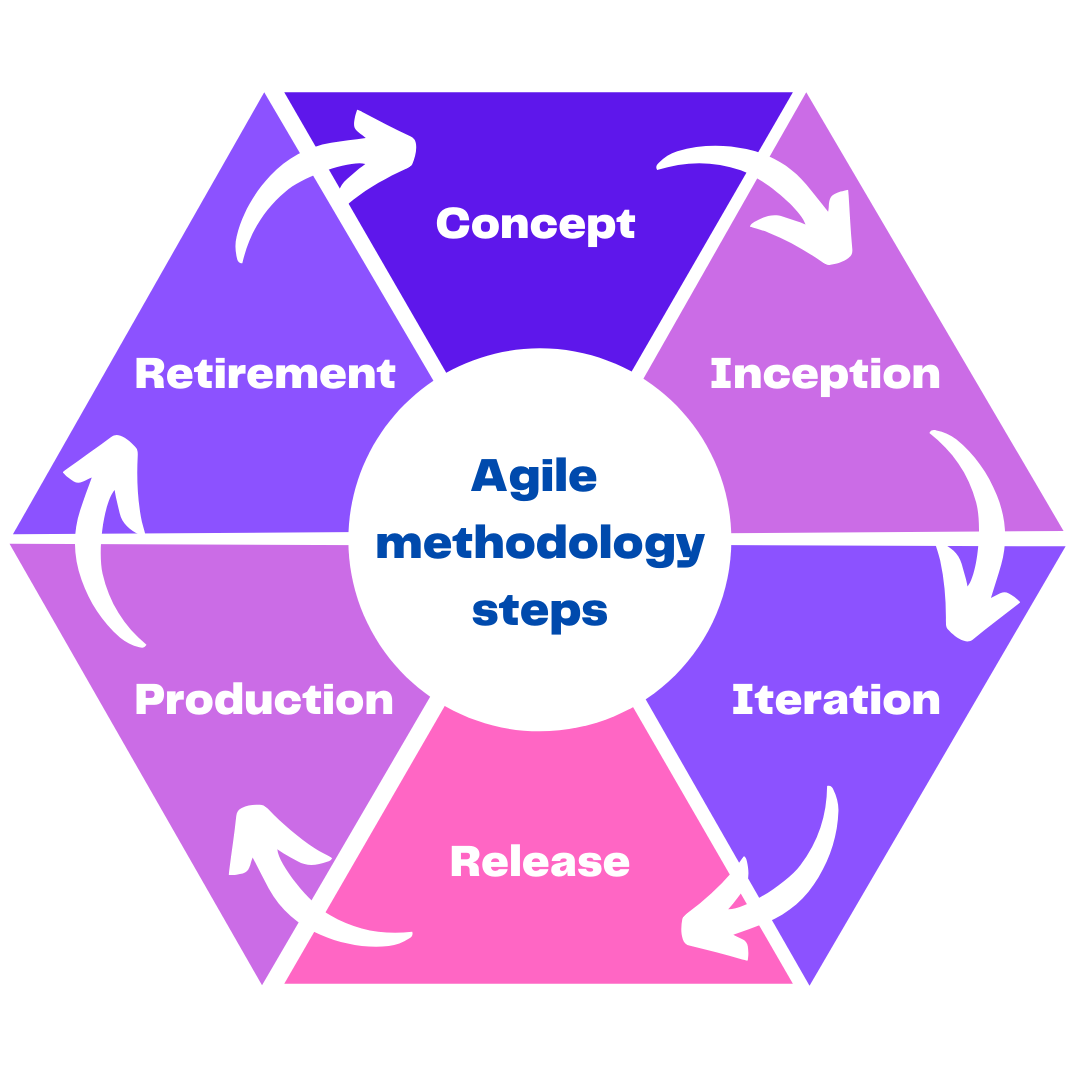
Agile project management methodology is a way of working that helps you plan every step perfectly and, at the same time, monitor progress and correct mistakes. Usually, it is distinguished by five or six steps:
- Concept—time to brainstorm and create the main idea of the project, together with opportunities and threats.
- Inception—planning the way the project will be delivered with the resources, rules, and requirements needed.
- Iteration—active work on the project consisting of the phases: Requirements, Development, Testing, Delivery, Feedback.
- Release—the moment of transforming the project from work into real life, associated with monitoring bugs and defects.
- Production—the most anticipated step, which is launching the product into the world.
- Retirement—the last step is sometimes associated with abandoning the project and closing work on it.
These steps are usually used in agile software development. However, with the technological progress in the business world, this approach is used in many different areas with bigger or smaller alterations.
Types of Agile Methodologies
There are several types of agile project management methodologies, each with its own principles and practices.
Here are the main ones, most popular and keenly used in some of the best companies:
- Scrum: Probably the most well-known, it involves breaking down the project into small, time-boxed iterations called sprints. It emphasizes regular inspection and adaptation.
- Kanban: This methodology focuses on continuous delivery, with work items visualized on a Kanban board. It aims to optimize the flow of work and minimize cycle time.
- Extreme Programming (XP): XP emphasizes technical excellence and customer satisfaction. It includes practices like pair programming, continuous integration, and frequent releases.
- Lean: While not strictly an agile methodology, Lean principles heavily influence agile processes. It centers on delivering value with the least amount of waste.
- Crystal: This family of methodologies is tailored to the specific needs of a project. Crystal methodologies include Crystal Clear, Crystal Yellow, and others.
- Dynamic Systems Development Method (DSDM): It provides a framework for delivering projects on time and within budget, focusing on frequent delivery and incremental progress.
- Feature-Driven Development (FDD): FDD is centered around designing features, creating a feature list, and building the features iteratively.
- Adaptive Software Development (ASD): ASD promotes flexibility and adaptability in the development process, allowing for changes based on feedback.
Based on these, you can choose your favorite agile project management processes most optimal to your needs, or stick to one particular Agile development method.
What to Look for in Agile Project Management Tools?
It’s hard to find appropriate agile project management software. Many tools do not meet the agile team’s requirements. An agile project is demanding and complex; that’s why we tried to describe a perfect tool.
Many features depend on what a specific team or project needs, but there are some functions that are always necessary. Here are the key features worth looking for in Agile tools for project management:
Task and Project Management
Cross-functional teams need not only project management, but task management too. At first glance, it is the same, but it is really different in purpose.
Project management in agile goes beyond traditional methods. Agile project management promotes constant communication, collaboration, and regular reassessment of priorities. This iterative approach allows for quick adjustments, ensuring the project aligns with evolving goals.
Planning Workload and Workforce
Team members should have the possibility to plan everything in one place. Project planning could be done on Kanban boards, Gantt charts, and other spaces that are essential for software development projects.
Agile tools should have many more features like resource management to track workload, backlog management for the project manager, and document management solutions to keep order. No matter if it’s Scrum methodology or Kanban board, a communication tool is necessary, especially in sprint planning or brainstorming.
Time Tracking
Time tracking is a good addition. It allows you to see how much time specific tasks require and, on this basis, to better manage the time of team members. Good time tracking features can also help boost productivity and spot efficiency-harming activities.
Flexibility
Agile management tools should be available for multiple devices and platforms so your agile development team (and other members of projects) can access them freely from any place at any time. And it’s a must if you have a remote team.
Additionally, integrations are often a helpful tool to create custom workflows and connect your Agile software development tools for better work. API can also help you build workflow automations.
Pricing
Don’t forget about the cost of the app itself. It is worth trying one that offers a free trial, which will save resources and allow you to choose the best tool. Also, pay attention to support and the possibility of quick contact with a customer support team.
What Are the Best Agile Project Management Tools?
Here’s a comprehensive list of the best agile project management tools with distinction into different categories.
Remember that although rooted in Agile, each tool will have distinct applicability and features. Nevertheless, they are all aimed at effective project management.
1. TimeCamp Planner
Best for: flexible task management and scheduling
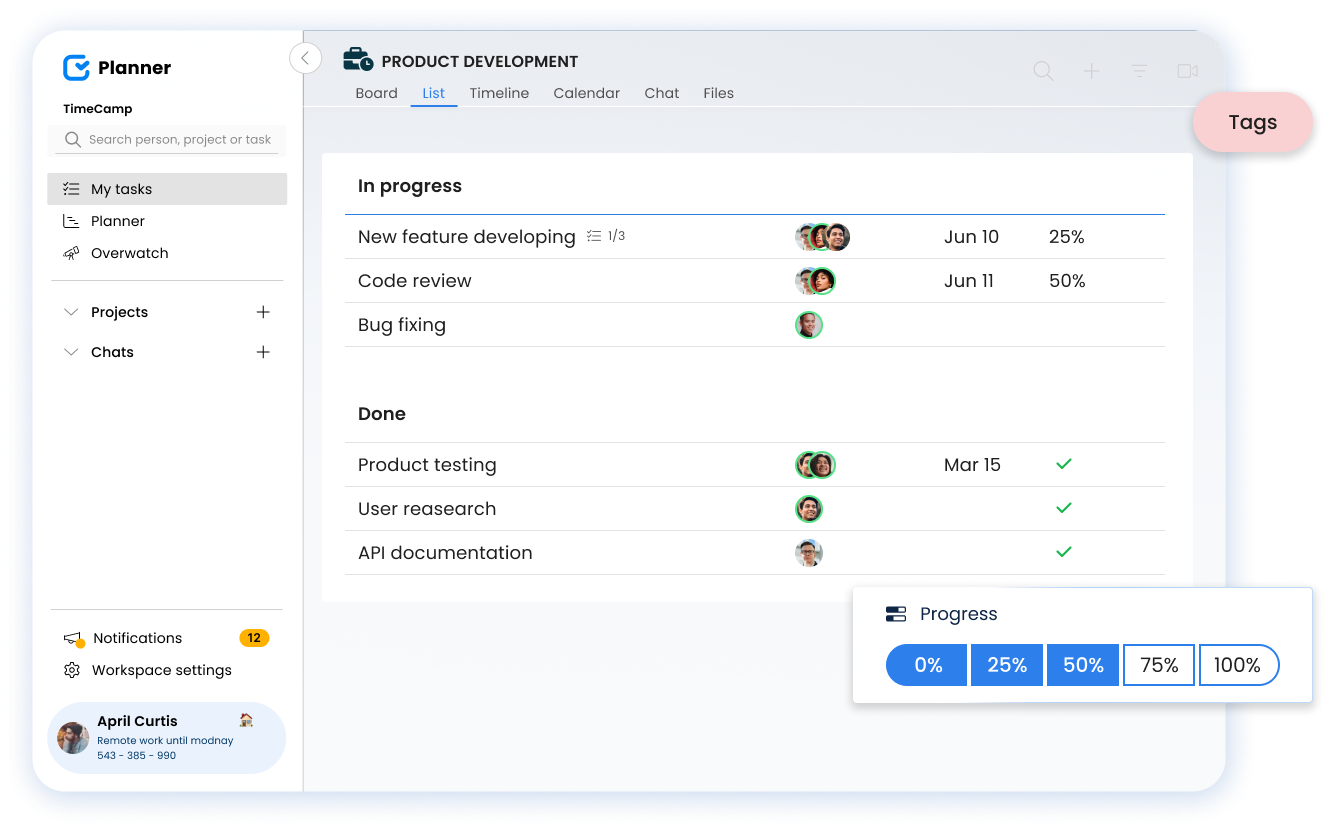
TimeCamp Planner is a tool that combines project management features like a Kanban board with tasks, lists, and calendar or timeline view with a communication tool. TimeCamp Planner allows every team member to manage multiple projects.
It’s useful for sprint planning, reviewing, tracking project progress and time thanks to integration with TimeCamp. TimeCamp Planner is developing all the time; its newest feature—the WIP (Work in Progress) limit, makes working on agile projects easier and easier.
Main features:
- A user-friendly, intuitive interface with no steep learning curve makes it easy to move around the app.
- You can create your own task structure in every space for different projects.
- Advanced features include tags, checklists, recurring tasks, custom task statuses and priority levels.
- TimeCamp Planner offers simple solutions with rich visualization features—a digital planner with a calendar, a Gantt chart with a timeline, estimates, a board view, Kanban boards, and to-do lists.
- You can set start and due dates, assignees, and estimates, quickly make a video call, or organize a team meeting to monitor project progress.
- Project chats and individual conversations, notifications with @mentions, file sharing, chatting directly in a task, or making a video call.
- The free plan offered by TimeCamp Planner also helps in daily collaboration with your clients, allowing you to invite up to five guests from outside your organization and give them access to particular spaces.
Availability and integrations: TimeCamp Planner offers a few vital integrations: with Trello, Google Hangouts, Calendar, Gmail, Zapier, Make, and TimeCamp for effortless time tracking. It’s available for all platforms
Pricing: The free plan is available for up to 5 users; the Pro plan costs $2.99 per user per month, billed annually ($3.99 billed monthly). TimeCamp Planner gives you an opportunity to check all premium features thanks to a 14-day trial.
Use TimeCamp Planner to keep project management under control
Discover comprehensive features tailored for every stage of team collaboration.
2. ProofHub
Best for: Unified collaboration space
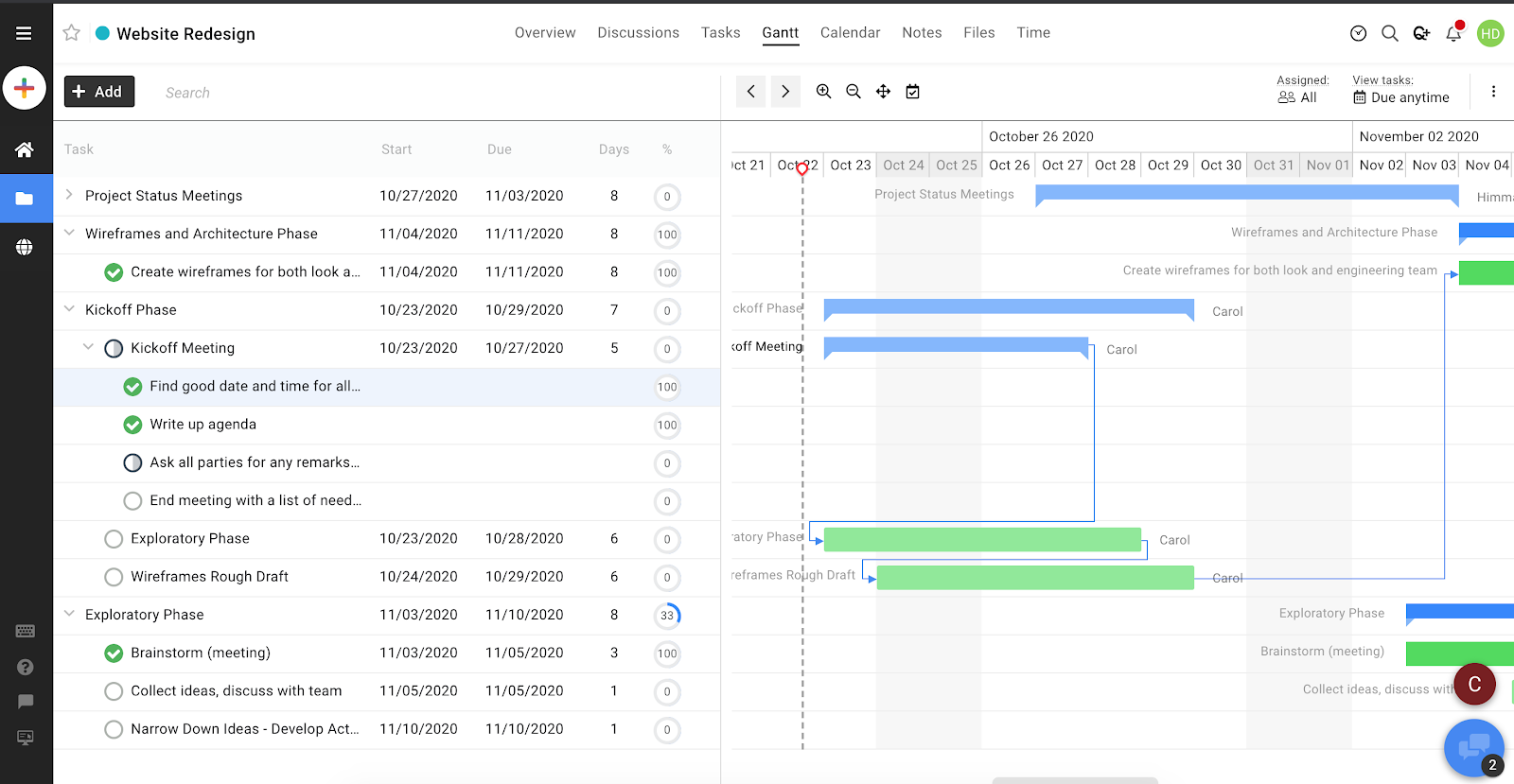
ProofHub is an agile project management software with a multitude of features that allow teams to work freely on projects and share ideas. It is based on the Kanban methodology and offers Gantt charts. These functions allow you to observe the workflow and enable visualization on a timeline. ProofHub makes it easy to plan and account for tasks at every stage.
In addition, it allows communication thanks to the built-in chat function. You can make one-on-one conversations or initiate group conversations. ProofHub makes it easy to comment, share feedback, and supervise multiple projects.
Availability and integrations: ProofHub integrates with several third-party apps (Slack, Box, Dropbox, Google Calendar and iCal, Google Dive, One Drive, and accounting apps—Freshbooks and Quickbooks). It’s available for web and mobile.
Pricing: ProofHub offers two pricing plans for a flat fee. Essential at $45 per month with 40 projects and unlimited users. Ultimate Control at $99 per month. Teams bigger than 100 users should contact with ProofHub. The app also offers a free 14-day trial.
3. Wrike
Best for: managing tasks, timelines, and resources in a team
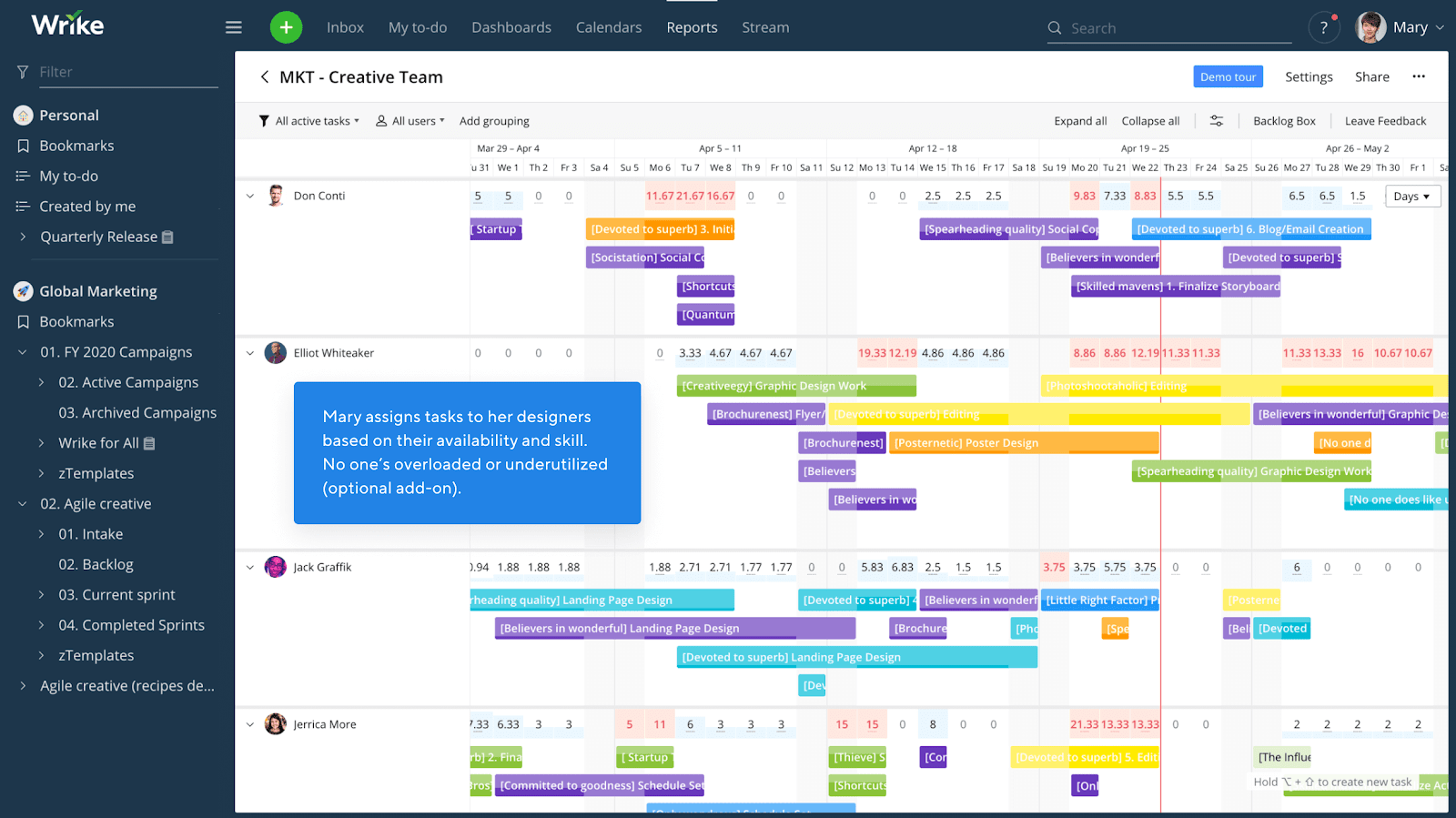
Wrike is the next agile project management tool, which makes working on projects easier. Wrike is a perfect tool for centralizing work and managing agile projects on a huge scale, but it’s not very intuitive. Wrike offers a board view and spreadsheet view, advanced task management, real-time collaboration, customizable workflows, and comprehensive reporting task management.
Wrike is mainly used in mid-sized or large projects, mainly because of the limited free version and the long process of learning. It’s time-consuming and can be frustrating. In contrast, comparing Wrike vs monday shows that monday.com provides a more intuitive interface, easier setup, and is well-suited for enterprise use
Availability and integrations: available for all platforms. You can integrate the tool with other third-party apps or use Wrike’s API to connect your favorite apps.
Pricing: Wrike is free for small teams. Other paid plans include: Team (at $9.80 per month), Business $24.80 user/month), and Enterprise and Pinnacle with custom pricing.
4. Asana
Best for: creating custom workflows Agile development teams
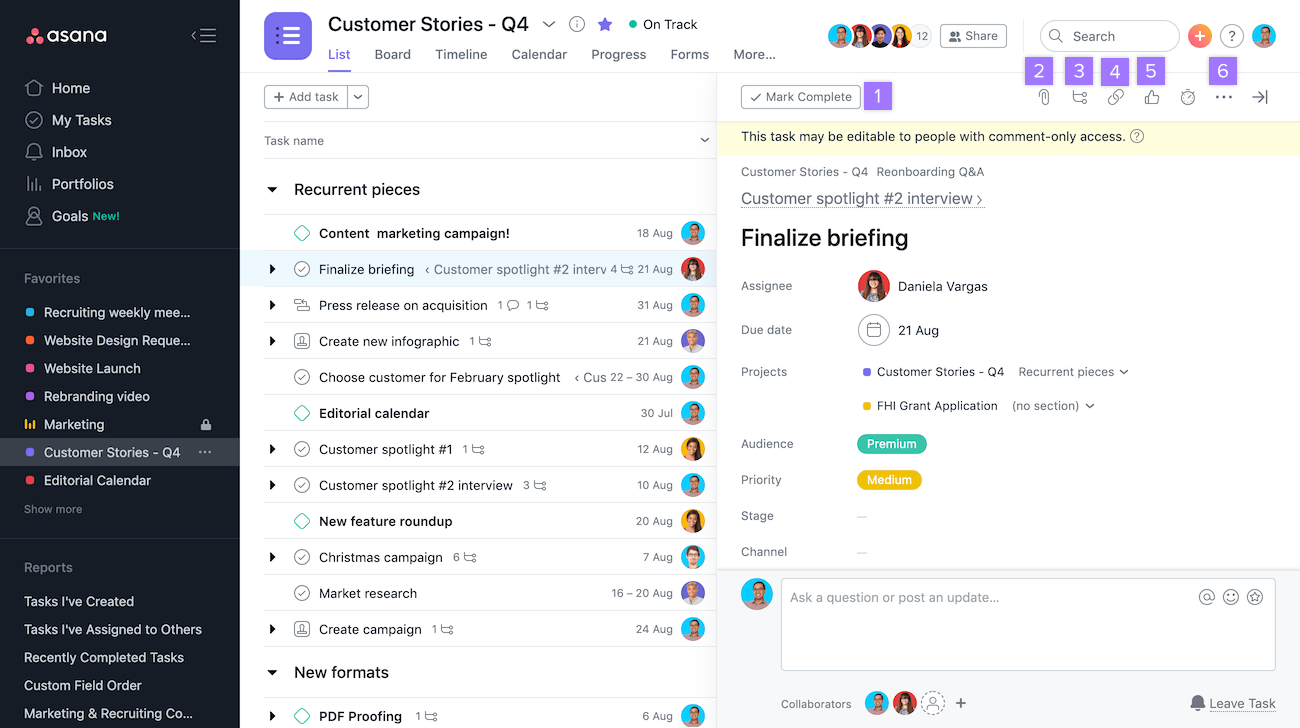
Asana is one of the best agile project management tools. Many features and integrations enable fast and organized work. And drag-and-drop feature makes task management easy, Gannt charts with timelines show you progress, and the Kanban board visualizes current tasks. Project planning could not be easier, because Asana offers to create stories to add them to sprints.
With this cloud-based app, your workflow will be better and better. The entire team would see benefits very fast while working on complex projects.
Availability and integrations: Asana easily integrates with plenty of third-party apps and is available all platforms.
Pricing: Free for up to 10 users. It will allow you to manage tasks in unlimited projects and add assignees and to dates to tasks. It is a perfect first step for more organized and professional task management.
5. Nifty
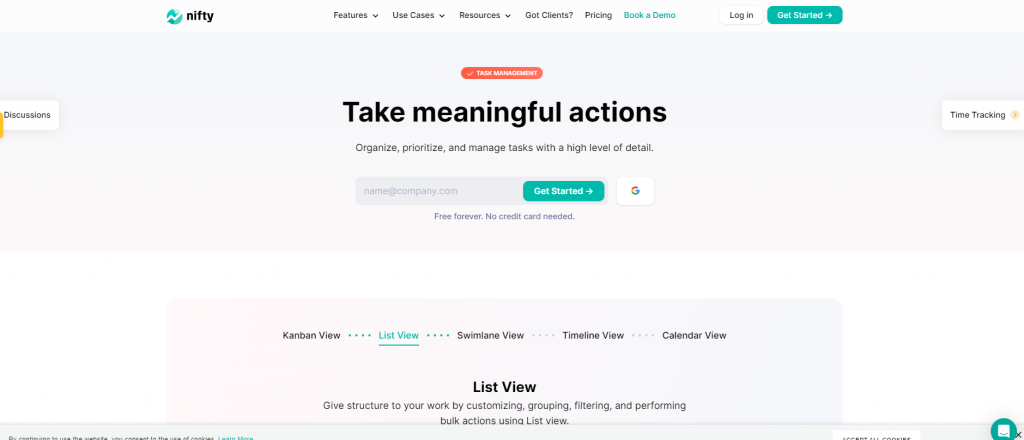
Nifty is a top agile project management tool, designed to streamline project workflows. Nifty excels in centralizing work and managing agile projects at scale, offering a robust set of features. However, some users find its interface less intuitive.
Nifty provides a board view and spreadsheet view, advanced task management, real-time collaboration, customizable workflows, and comprehensive reporting capabilities.
Primarily used in mid-sized to large projects, Nifty’s free version is limited, and the learning curve can be steep, leading to some frustration and time investment.
Availability and integrations: Nifty is available across all platforms. It offers seamless integration with various third-party apps or the use of Nifty’s API to connect with your preferred tools.
Pricing: Nifty offers a free forever plan for small teams.
6. Planview
Best for: portfolio management and work management
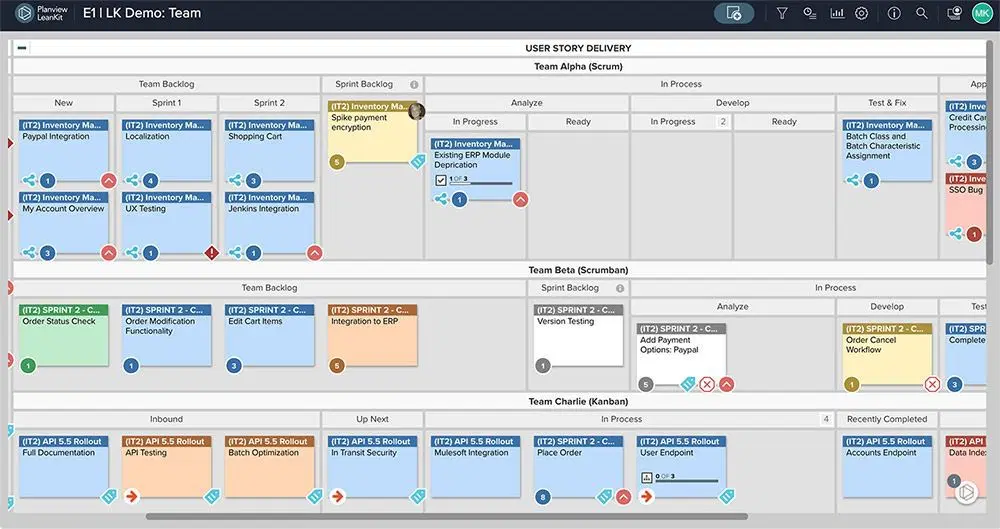
Planview is a software company that specializes in providing solutions for project and portfolio management. They offer a range of tools to help organizations plan, execute, and manage projects efficiently. Their software often includes features for resource management, collaboration, and strategic planning.
Moreover, Planview is attuned to the pulse of continuous improvement, providing organizations with tools to refine their processes over time.
Availability and integrations: Plan view offers several integrations with some of the biggest project management tools for workflow automation. There’s also API available for personal integrations and add-ons.
Pricing: Planview typically offers various pricing plans based on the specific product or suite of tools you’re interested in. Pricing can also depend on factors like the size of your organization, the number of users, and the features you require. There’s a 30-day free trial available.
7. Monday
Best for: tracking project status visually in a minimalistic way
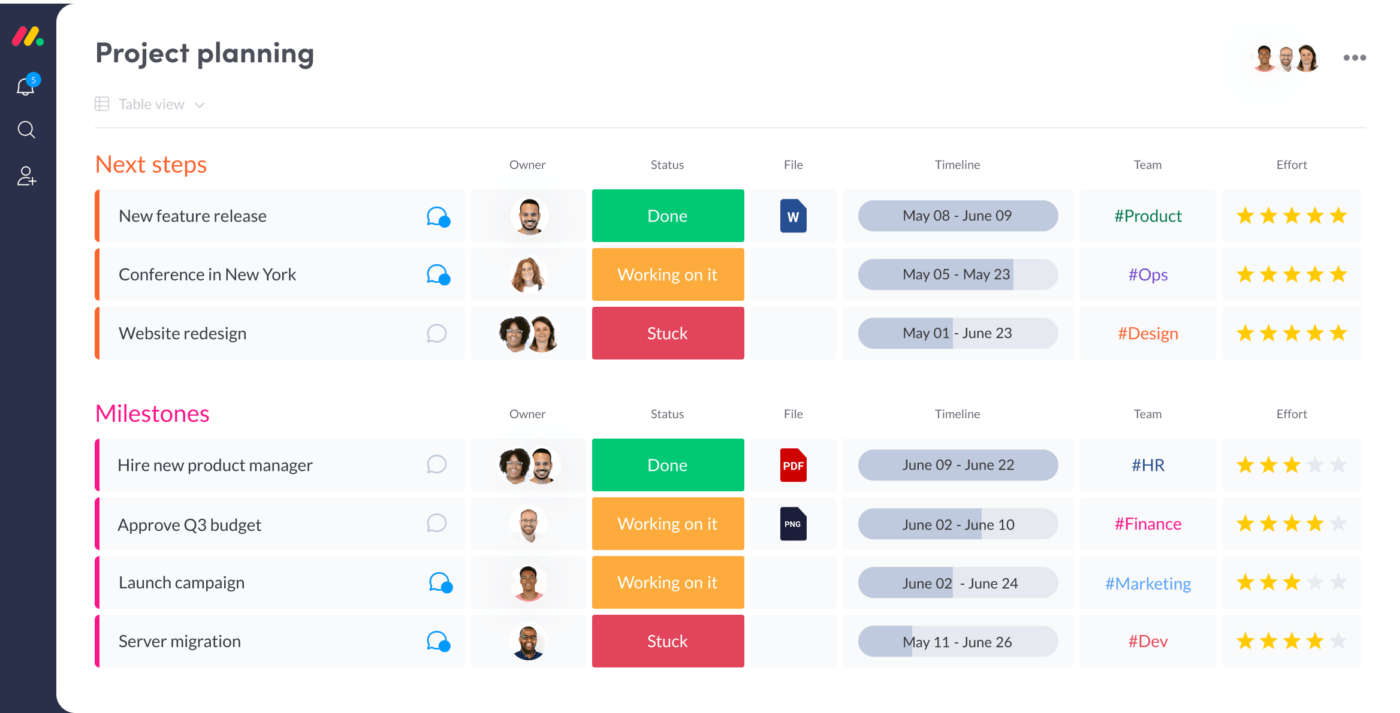
Monday is the next one of the best Agile project management tools. It’s based on a Kanban board, timeline, and charts. It enables reporting, tracking of project progress, planning sprints, and creating user stories. Monday allows good collaboration features and integrations with other tools.
Monday is suitable for software development teams or scrum teams of different sizes, as well as project managers who need a simple solution. The entire organization will benefit from using Monday.
Availability and integrations: What makes Monday powerful are numerous integrations with the most used and popular apps. Monday is available for all platforms.
🧩Check out TimeCamp integration with Monday and improve your time management!
Pricing: Monday is free for two seats, which makes it the best option for individuals and freelancers.
8. ClickUp
Best for: teams working on different types of projects
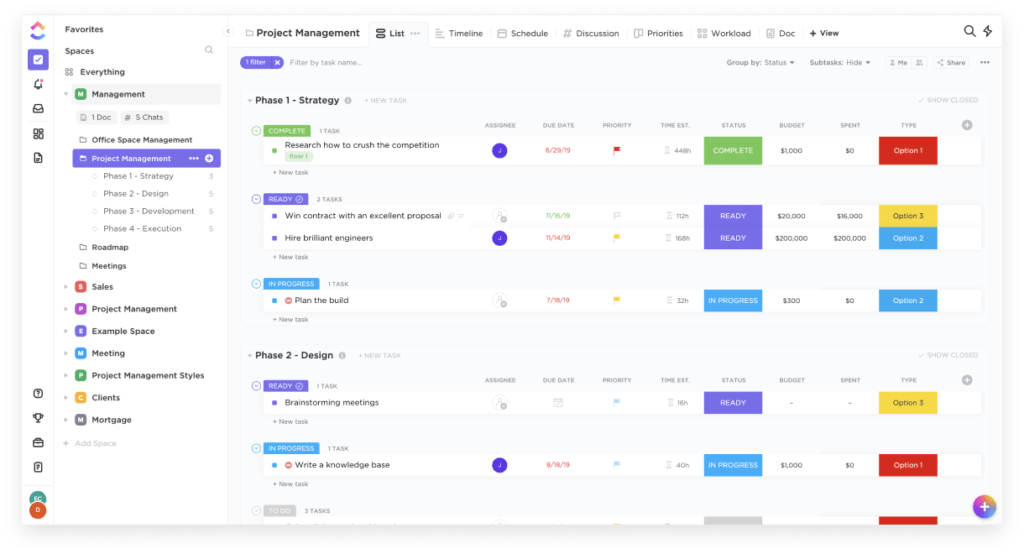
ClickUp is an agile project management tool for many different things: task management, time tracking, or sprint planning. ClickUp offers document management, special notifications, goals, calendar, scheduling, and even a built-in inbox. It’s perfect for agile project management, because of its multifunctionality, intuitive interface, and ease of use for multiple team members.
ClickUp gives you the opportunity to track tasks live, thanks to the mobile app, which could be everywhere you are. This agile software improves team collaboration and makes work more efficient.
Availability and integrations: ClickUp offers plenty of integrations with almost all third-party apps, including TimeCamp time tracking. There are also templates and API, so you can better customize workflows. It’s also available all platforms.
Pricing: ClickUp offers a free forever plan with limited functionalities and storage. Unlimited Plan with all features is $7 per user per month, and Business Plan is $19 per user per month.
9. Atlassian Jira
Best for: technical project management and issue tracking
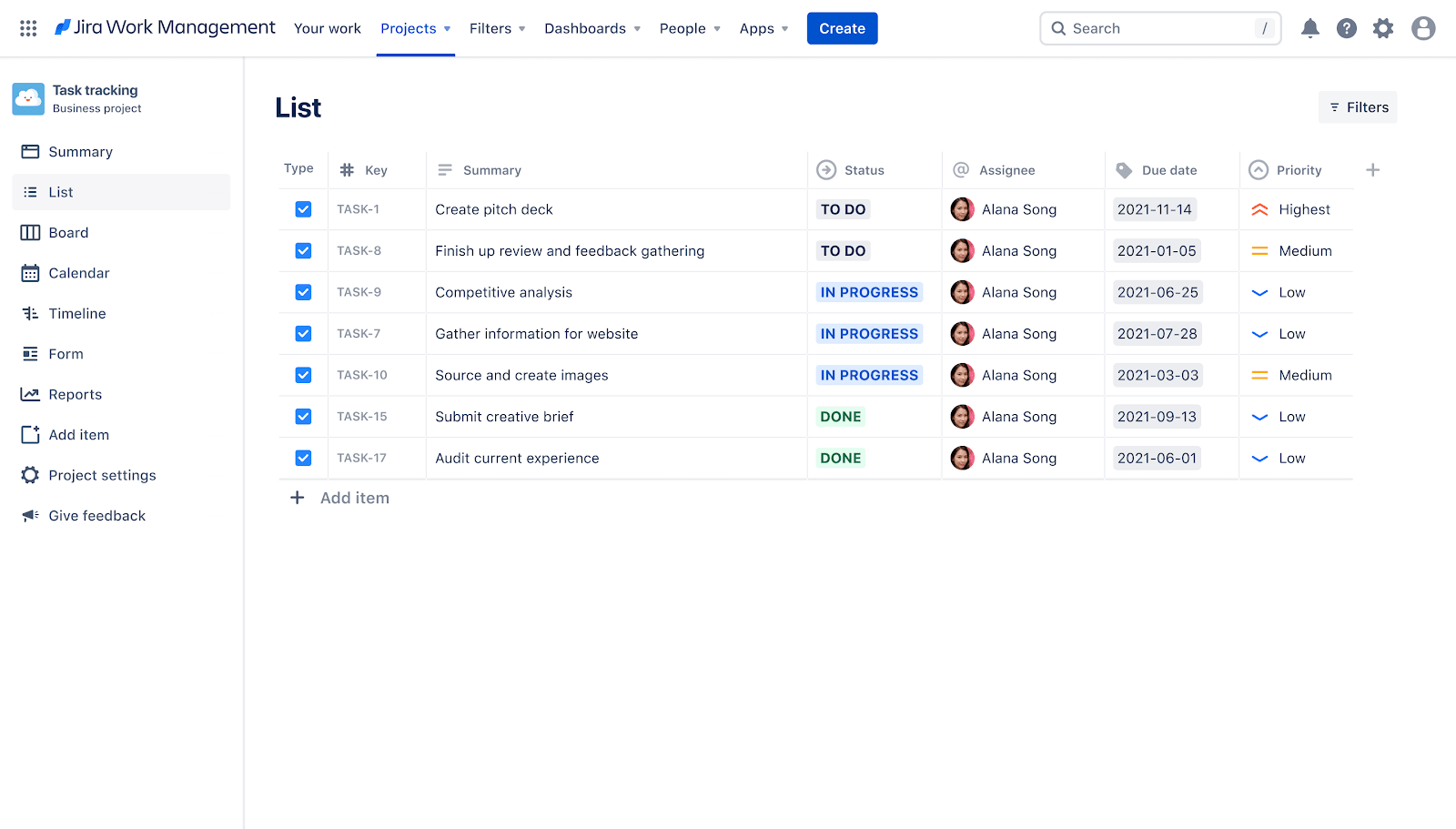
Jira is one of the most popular agile project management tools. Jira has many features and advantages, like a task management tool, Kanban board, issue tracking, bug tracking, custom fields, and many more. But because of its complexity, it’s not very intuitive and too demanding for simple sprint planning or project running.
Jira is the best for developed teams from IT, finances, operational areas. Its huge pros is high expandability and remarkable configuration, that’s why so many organizations use it.
Availability and integrations: Jira is available as a cloud solution. You can also choose numerous add-ons from Atlassian marketplace to create customized workflows for efficient project management.
Pricing: Jira offers fully functional trials of the cloud products and plans. Cloud Standard can be trialed for 14 days, and Cloud Premium/Cloud Enterprise can be trialed for 30 days. Free plan is available for up to 10 users; other plans include: Standard: $8.50/user/month, Premium at $16/user/month, and Enterprise plans are also available with custom pricing.
10. Quire
Best for: team collaboration and planning
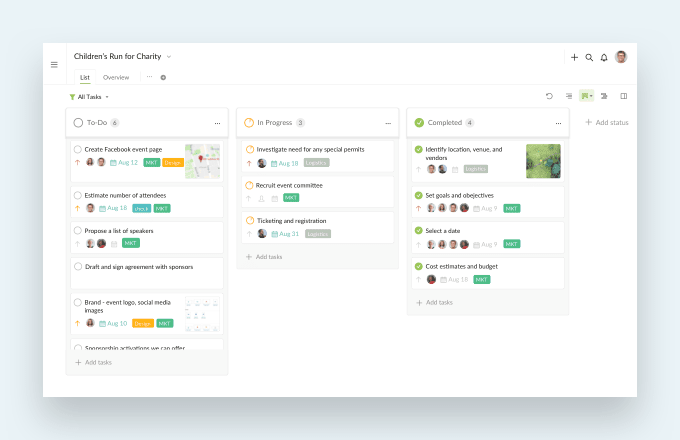
Quire is an agile project management tool based mainly on Kanban boards. It offers task lists, recurring dates, due dates, start dates, calendars, and dynamic reports for managing projects. This agile project management tool is very intuitive and simple and gives you project templates, so it won’t take much time to figure out how Quire works.
Quire is perfect for basic, small and medium-sized agile teams. It could easily support agile practices, so your team will understand the idea very fast.
Availability and integrations: Quire is available for web and mobile apps.
Pricing: You can choose a free plan with basic features or choose one of the 3 pricing plans starting at $10.95.
11. Trello
Best for: simple, card-based project management
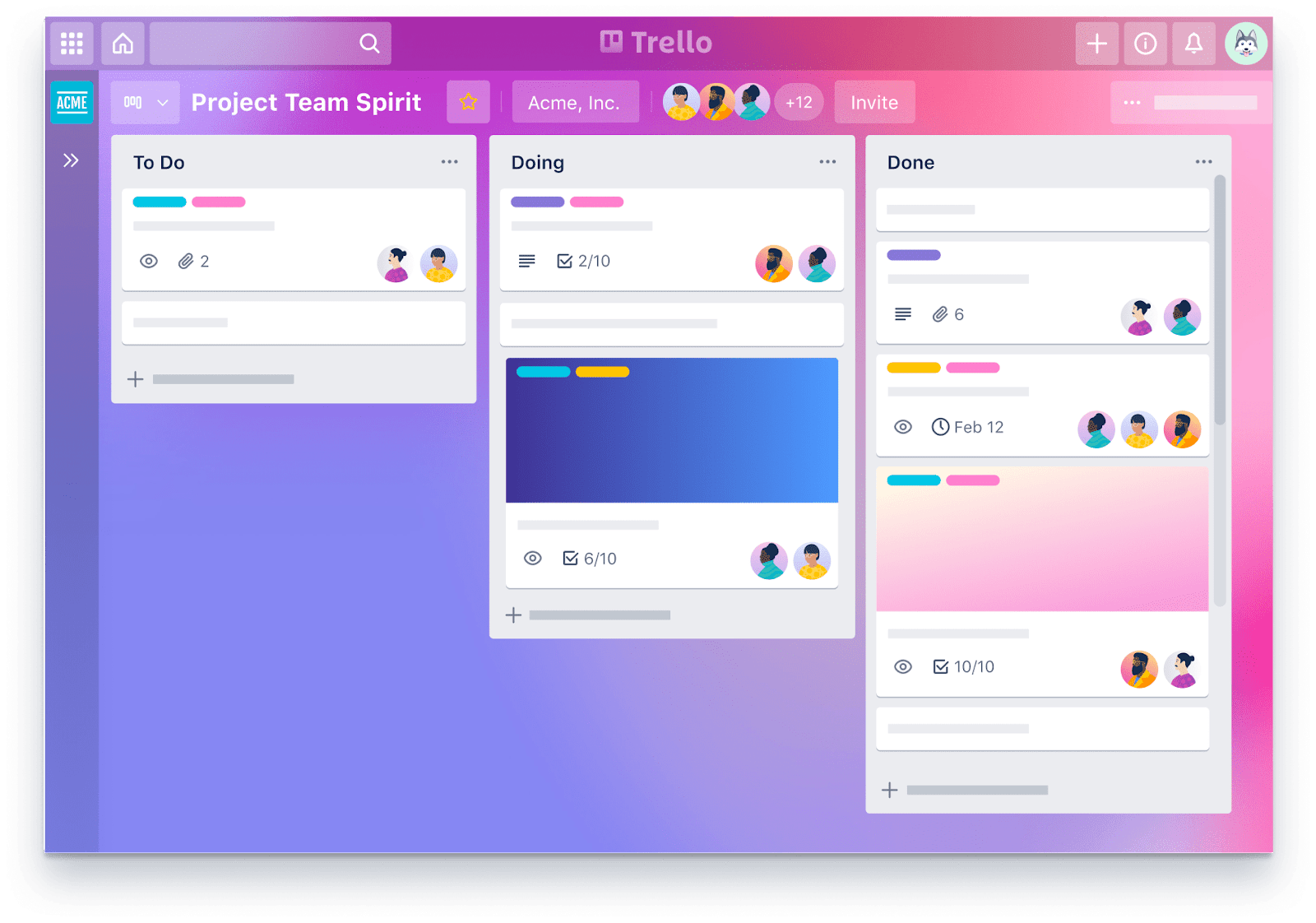
Trello stands out as a top-notch agile tool for agile project management thanks to its visual workflow, adaptability, and user-friendly interface. Its card-based system provides a clear visual representation of tasks, fostering collaboration and transparency.
The tool’s flexibility allows teams to easily adjust to changing project requirements and track progress without effort. Trello’s alignment with agile principles, coupled with its intuitive design, makes it a go-to choice for teams aiming for efficient and collaborative project management.
Availability and integrations: In the free version, you can choose unlimited power-ups per board from a variety of available ones. You can also check TimeCamp integration with Trello for powerful time tracking and rich productivity reports.
Pricing: Trello has a free plan that doesn’t offer all the features necessary for Agile project management. The Business Class plan offers extra features for larger teams, and there’s an Enterprise plan for advanced functionalities and enhanced security.
12. Zentao
Best for: team communication and collaboration for technical teams
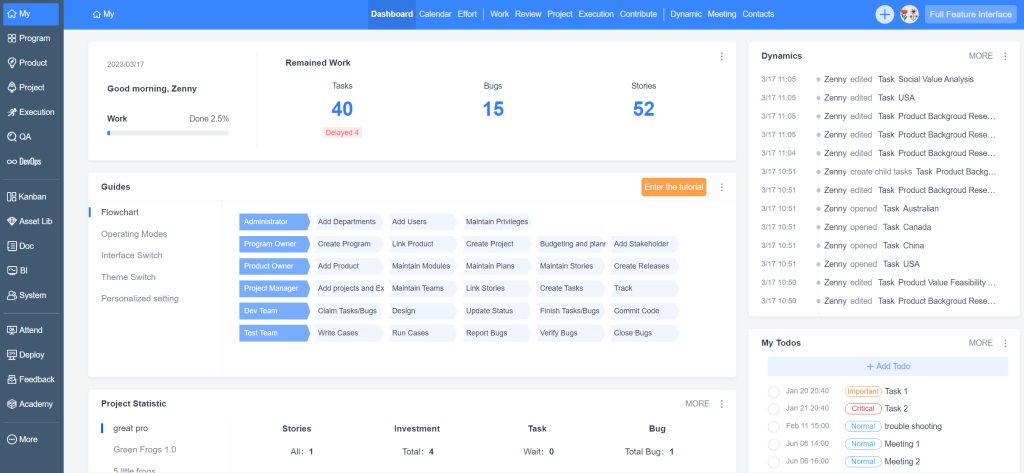
Zentao is an open-source project management and team collaboration tool that combines features like task management, bug tracking, document management, agile boards and more. It’s designed to enhance productivity and streamline workflows for teams.
Zentao is not just for managing tasks but for the entire project lifecycle. It follows Agile principles and includes features like product management, release management, and test management. The platform aims to provide a comprehensive suite for teams, fostering collaboration and ensuring a smoother development process.
Availability and integrations: Zentao offers integrations with Git, SVN, LDAP, Jenkins, TestLink, and email services, enhancing its adaptability to various development and project management environments. Or you can create personal integrations with the API. The tool is available as a self-hosted or cloud solution.
Pricing: The Free Community Edition is available at no fee with unlimited users and projects. For more features, you need to choose one of the paid options: 1) ZenTao Biz with a one-year license at $39.9 per user or ZenTao Max with a one-year license at $59.9 per user.
13. Businessmap
Best for: scaling business agility and aligning on organization goals
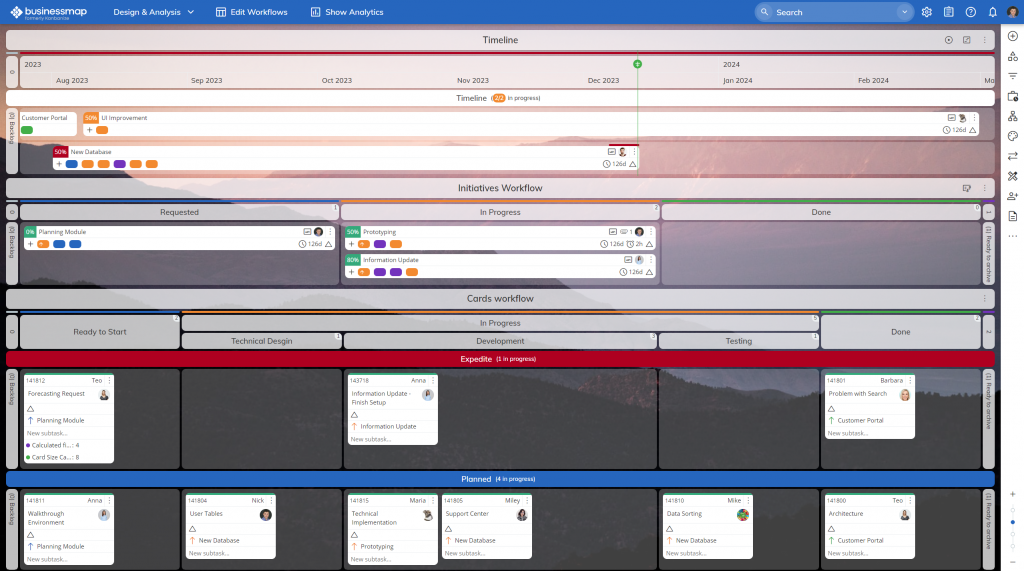
Businessmap is an Agile project and portfolio management tool leveraging the Kanban method to enhance workflow efficiency and transparency. It visualizes projects, tracks progress, and supports scaling across multiple teams. Key features include a clear work breakdown structure, built-in OKR functionality, and historical data for planning.
The platform connects strategy with execution through flexible management and team boards. It offers customizable executive dashboards for a central view of the company’s activities. Praised for its extensive customization and integration options, Businessmap aligns strategic goals, project portfolios, and work activities, ensuring comprehensive organizational visibility and optimization.
Availability and integrations: Businessmap is available for all desktop platforms and mobile apps. It integrates with some of the most useful digital tools, such as Power BI, Microsoft Teams, Slack, Google Drive, GitHub, GitLab, and more. Other than that, you can also use Businessmap’sn API to build, integrate, or enhance any custom scenario.
Pricing: Businessmap offers flexible plans and optional add-on features you can add or remove anytime. The Standard pricing plan starts at $149/mo for a team of 15 users. Customized pricing is available for users interested in enterprise solutions. The product comes with a 14-day free trial.
What Is Your Favorite Agile Software?
Finding the best agile project management tools isn’t an easy task, but it’s worth trying different tools to have a broader view. We hope that our tips and list will help you and you and your team members be happy with your new agile software.


